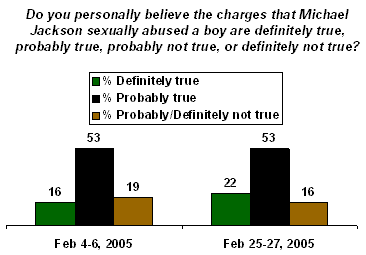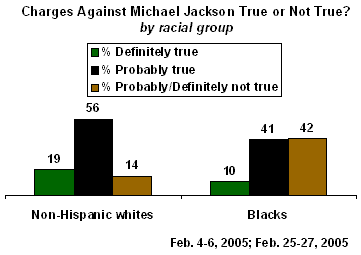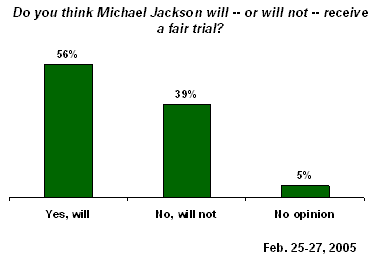GALLUP NEWS SERVICE
PRINCETON, NJ -- As the second week of Michael Jackson's child molestation trial begins today, a recent CNN/USA Today/Gallup poll shows that a majority of Americans say the charges against him are true. A majority of Americans also say that Jackson will receive a fair trial. Blacks and whites differ in their views of Jackson's guilt or innocence, with most whites saying the charges against Jackson are true, while blacks are divided on the issue.
The poll was conducted Feb. 25-27, on the eve of the trial, and shows 75% of Americans saying the charges that Jackson sexually abused a boy are definitely (22%) or probably (53%) true. Only 16% believe the charges are untrue, and 9% have no opinion. An early February poll found 69% of Americans believing the charges to be true and 19% taking the opposite view.

Gallup asked two similar versions of this question in late 2003 and early 2004. In early December 2003, after Jackson's initial arrest in this matter, 62% said the allegations were true. This sentiment dipped to 54% in mid-December, probably due to the fact that the authorities had not yet formally charged Jackson when the poll was conducted. By late January/early February 2004, two in three respondents, 67%, said the allegations were true.
Whites, Blacks Differ in Their Views of Jackson's Guilt
In order to better examine the views of whites and blacks in this matter, Gallup combined the results of its Feb. 4-6, 2005, and Feb. 25-27, 2005, polls. The results show that the vast majority of non-Hispanic whites, 75%, say the charges against Jackson are definitely (19%) or probably (56%) true. Only 14% say they are not true. Blacks are more divided in their views of Jackson's guilt, with 51% saying the charges are true, and 42% saying they are not true.

The opinions of blacks were quite different immediately following Jackson's arrest in 2003. At that time, nearly two in three blacks said the allegations against Jackson were untrue. Roughly two in three whites at the time said they were true.
Fair Trial for Jackson?
Whenever a case attracts a lot of media attention, questions are raised as to whether the defendant will get a fair trial -- since prospective jurors may have been exposed to speculation about the person's guilt or innocence before hearing the full range of evidence in court. Americans, however, are not overly concerned about this -- 56% say Jackson will get a fair trial; 39% say he will not.

Nonwhites are more skeptical that Jackson will receive a fair trial. The poll shows that 59% of non-Hispanic whites say Jackson will get a fair trial, compared with only 45% of nonwhites. (These results are based on the sample of all nonwhites because the sample size of blacks is too small to report reliably on the "fair trial" question.)
The data also show some differences by age. Thirty-eight percent of adults aged 18 to 29 say Jackson will get a fair trial, compared with 54% of 30- to 49-year-olds and 64% of adults aged 50 and older.
The O.J. Simpson Case
This is not the first highly publicized court case that Gallup has tracked in recent years. In 1994 and 1995, Gallup repeatedly asked Americans whether the charges that O.J. Simpson murdered his ex-wife, Nicole Brown Simpson, and her friend, Ronald Goldman, were true.
In early February 1995, just after the Simpson trial had begun, Gallup found that roughly two in three Americans said the charges against Simpson were true -- a slightly lower percentage than Gallup currently finds for Jackson.
Throughout the 36 weeks of the trial, the percentage of Americans saying the charges against Simpson were true ranged from 61% to 75%. In June 2004, on the 10th anniversary of the deaths of Nicole Brown Simpson and Goldman, Gallup found that 78% of Americans still believed that O.J. Simpson committed the murders.
Do you personally believe the charges that O.J. Simpson murdered Nicole Brown Simpson and Ronald Goldman are definitely true, probably true, probably not true, or definitely not true?
|
|
|
|
|
Definitely/ |
|
% |
% |
% |
% |
|
|
2004 Jun 3-6 |
35 |
43 |
78 |
16 |
|
1999 Feb 26-28 |
35 |
38 |
73 |
21 |
|
1996 Dec 9-11 |
36 |
38 |
74 |
18 |
|
1996 Apr/May |
35 |
40 |
75 |
20 |
|
1995 Oct 19-22 |
30 |
40 |
70 |
22 |
|
1995 Oct 5-7 |
30 |
37 |
67 |
25 |
|
1995 Sep 29-30 |
30 |
33 |
63 |
23 |
|
1995 Aug 28-30 |
30 |
37 |
67 |
23 |
|
1995 Jul 20-23 |
29 |
40 |
69 |
21 |
|
1995 Jul 7-9 |
34 |
39 |
73 |
19 |
|
1995 Jun 5-6 |
33 |
42 |
75 |
17 |
|
1995 Apr 17-19 |
24 |
41 |
65 |
22 |
|
1995 Mar 17-19 |
17 |
44 |
61 |
24 |
|
1995 Feb 3-5 |
20 |
45 |
65 |
22 |
|
1995 Jan 16-18 |
24 |
46 |
70 |
19 |
|
1994 Oct 7-9 |
14 |
48 |
62 |
21 |
|
1994 Sep 18, 20 |
14 |
47 |
61 |
20 |
|
1994 Jul 15-17 |
16 |
51 |
67 |
20 |
|
1994 Jul 1-3 |
12 |
50 |
62 |
21 |
|
1994 Jun 22 |
10 |
56 |
66 |
16 |
There is an interesting difference between the Jackson case and the Simpson case: blacks are more likely to say Jackson is guilty at this early stage of the trial than they were to say Simpson was guilty at the start of his trial. As the Simpson trial got underway, the majority of blacks said the charges against Simpson were not true, while roughly a quarter of blacks said the charges were true. About one in five blacks were unsure of Simpson's guilt at the time.
Survey Methods
Results in the current survey are based on telephone interviews with 1,008 national adults, aged 18 and older, conducted Feb. 25-27, 2005. For results based on the total sample of national adults, one can say with 95% confidence that the maximum margin of sampling error is ±3 percentage points.
For results based on the sample of 1,674 non-Hispanic whites, in polls conducted Feb. 4-6, 2005, and Feb. 25-27, 2005, the maximum margin of sampling error is ±3 percentage points.
For results based on the sample of 144 blacks, in polls conducted Feb. 4-6, 2005, and Feb. 25-27, 2005, the maximum margin of sampling error is ±9 percentage points.
In addition to sampling error, question wording and practical difficulties in conducting surveys can introduce error or bias into the findings of public opinion polls.
